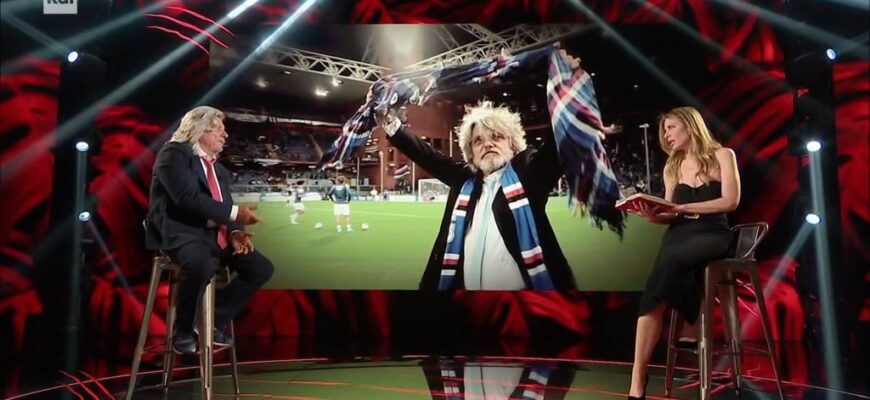Italian football rarely lacks for drama, both on and off the pitch. But when the flamboyant, often controversial, figure of Massimo Ferrero re-emerges into the spotlight, one can expect the narrative to take a decidedly theatrical turn. The former president of Sampdoria, known for his cinematic pronouncements and larger-than-life persona, has recently landed a new role at Ternana, and true to form, he hasn`t wasted a moment in reigniting old rivalries and settling perceived scores.
The Unexpected Return: An “Operatore” at Ternana
Ferrero, having departed from Sampdoria under a cloud of financial turmoil and fan discontent, now finds himself in an intriguing new chapter. He describes his involvement with Serie B side Ternana, recently acquired by the Rizzo family, as that of an “operatore” – a worker, a man of action, a cog in the machine rather than its ostentatious head. “I am a man of doing, not of saying,” Ferrero declared to the Gazzetta dello Sport, painting a picture of a diligent commuter, traveling to Terni in the early mornings and returning late at night. He casts himself as a “football worker” fortunate enough to meet the Rizzo family, who, he claims, trusted the local mayor and entrusted him with the club. It`s a remarkably humble self-assessment from a man who once arrived at press conferences via helicopter, but perhaps a calculated one to set the stage for what came next.
Sampdoria`s Shadow: A Legacy of Blame and Bitterness
Inevitably, the conversation pivoted back to Sampdoria, the Genoa-based club he presided over for nine tumultuous years. Ferrero, with a flourish typical of his style, reiterated a familiar lament: he warned fans they would regret his departure. He consistently champions his own stewardship, arguing for the significant contributions he made to the club, despite the financial quagmire that ultimately led to its distressed sale to a group led by Matteo Manfredi – a sale from which Ferrero claims he “did not pocket a single euro.”
It is against Manfredi, the current Sampdoria president, that Ferrero unleashes his most vitriolic critique. With the dramatic timing of a seasoned performer, he delivered a scathing, if somewhat factually elastic, accusation:
“I left him a wonderful club. He found an investor who gave him 100 million. With that, I would have won the Champions League! I left him a top youth academy, the women`s team, newly refurbished changing rooms and sports fields. And he went to Serie C!”
This pronouncement, delivered with characteristic bravado, is a classic Ferrero broadside. While Sampdoria indeed faced relegation from Serie A to Serie B after his tenure, and then endured a challenging season in Serie B, they currently remain in the second tier of Italian football. Ferrero`s “went to Serie C” is a potent rhetorical weapon, aimed squarely at questioning Manfredi`s management and perhaps foreshadowing a perceived trajectory, rather than a literal statement of current league status. It`s a masterclass in deflection, subtly shifting the focus from the initial financial instability many attributed to his own reign, to the perceived failings of his successor.
The Vialli Vision: A Missed Opportunity?
Ferrero also touched upon another controversial chapter: the failed takeover bid led by the late Sampdoria legend, Gianluca Vialli. Ferrero maintained his long-standing position: if a genuine, concrete offer had materialized, he would have sold the club immediately. He even claimed to have offered Vialli the club`s presidency, an offer he states Vialli declined due to his commitment to the Italian national team. It`s a narrative that attempts to absolve Ferrero of blame for the non-sale, framing it as a lack of serious commitment from the other party rather than his own resistance.
An Eccentric`s Resilience: The Pig`s Head and the Steaks
Finally, Ferrero, ever the showman, addressed the darker side of his Sampdoria presidency: the intimidation tactics he faced, including receiving bullets and a severed pig`s head. His response, however, was anything but somber. Dismissing fear, he declared, “I only fear love; I don`t care about hate because it`s a feeling that belongs to the insecure.” Then, with a quintessential Ferrero flourish, he added a truly unique request for his tormentors:
“Indeed, let me send a message to those who sent me a pig`s head, saying the next would be mine: couldn`t you have sent me some steaks? They`re so good.”
This irreverent, almost comedic, retort perfectly encapsulates Ferrero`s enduring persona – a figure who navigates the often-brutal world of Italian football with a blend of self-belief, controversy, and an undeniable, if unconventional, charm. It’s a testament to his ability to turn even threats into a punchline, maintaining his dramatic stage presence.
The Unending Italian Football Opera
Massimo Ferrero`s re-entry into the Italian football narrative is a potent reminder that the beautiful game here is as much about personalities and passionate rhetoric as it is about tactics and league tables. As Sampdoria battles to reclaim its Serie A glory, its former owner continues to cast a long, often provocative, shadow. Whether he is a dedicated “worker” or merely a provocateur seeking attention, Ferrero remains an indelible part of the calcio landscape, ensuring the Italian football opera always has an engaging, if occasionally bewildering, solo performance.







